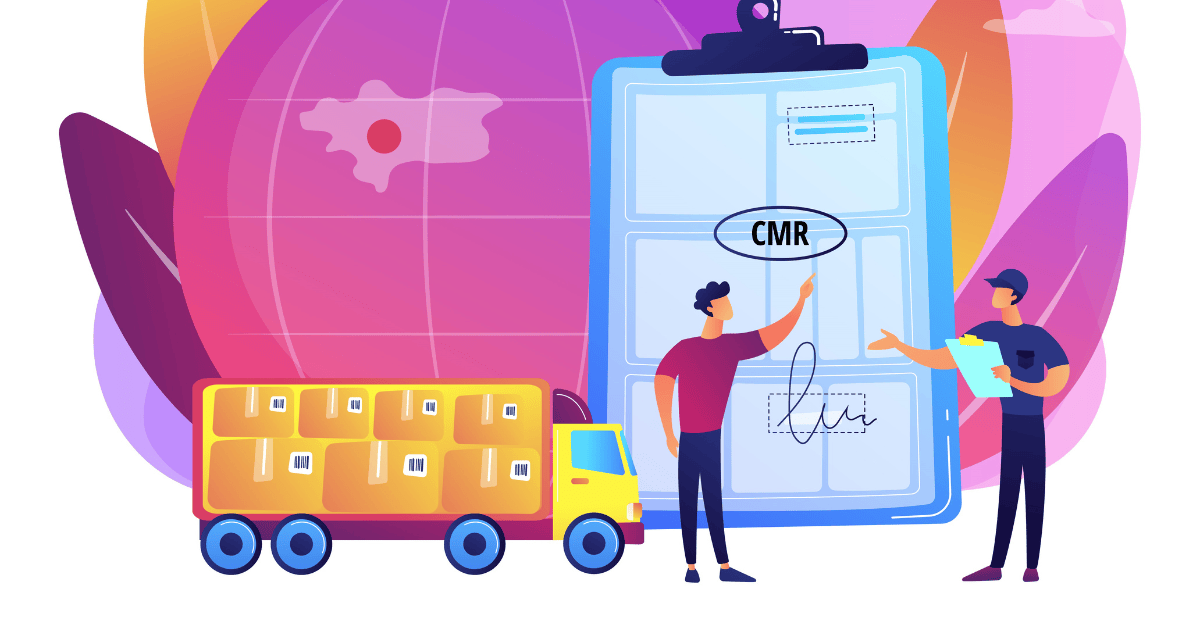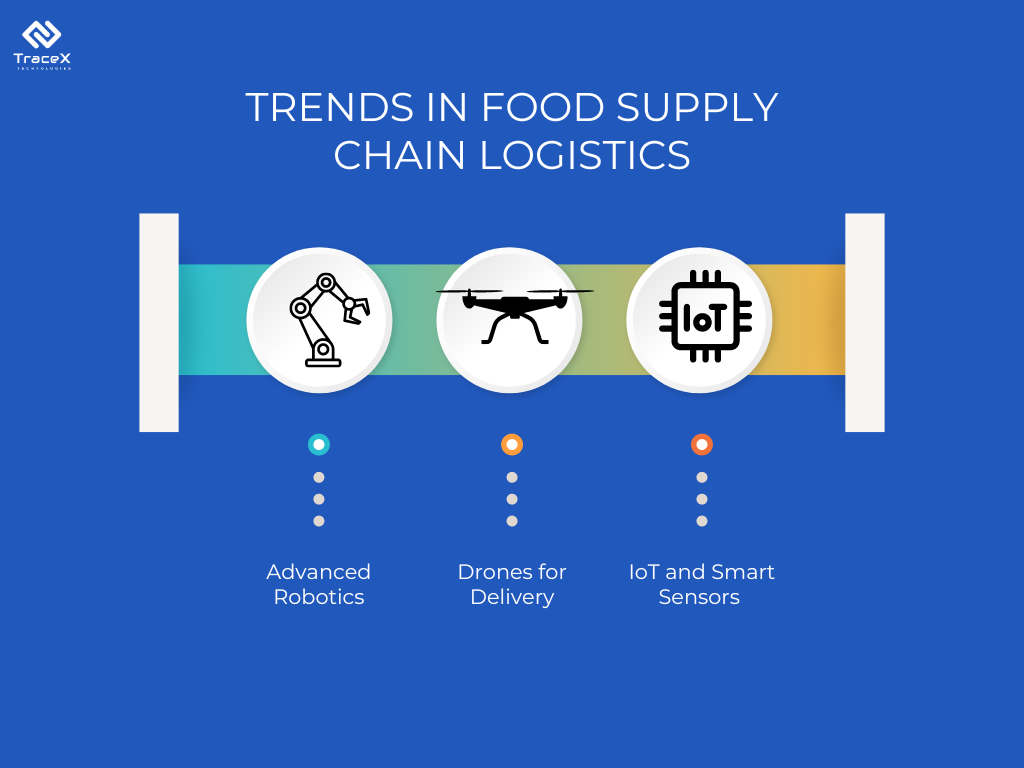Contact: +91 99725 24322 |
Menu
Menu
Quick summary: Explore the complex world of food logistics and its impact on businesses and consumers. Learn how innovative solutions like blockchain, AI, and automation can optimize processes, reduce waste, and ensure food safety.

Whether you’re grabbing a cup of coffee in the morning or picking up fresh produce from the grocery store, logistics in food supply chain ensures that food products make it from farms to your table, efficiently and safely. But managing this process is no small feat.
According to World Bank, even with record food production, global hunger is intensifying, and food insecurity remains especially severe in fragile and poorly connected regions because of high transport costs. In some cases, logistics account for half of the delivered price of food products.
Logistics play a critical role in food supply chain management. From farm to fork, every step in the food supply chain must be handled with precision, ensuring quality, reducing waste, and optimizing resources.
Key Takeaways
Logistics in the food supply chain refers to the detailed coordination of various activities that ensure food products are grown, processed, transported, and delivered efficiently. It covers everything from sourcing raw materials, transportation, warehousing, inventory management, and final delivery to the consumer.
While the concept of logistics applies to all industries, food supply chain logistics is uniquely complex. Food products are highly perishable, demand stringent quality control, and often require specialized storage and transportation (think refrigerated trucks for frozen goods).
In essence, logistics is the backbone of the food industry, enabling businesses to keep up with demand while minimizing costs, ensuring safety, and reducing environmental impact.
Food supply chains face a variety of challenges that logistics must solve to meet modern consumer expectations. Here’s why logistics is crucial:
To overcome these challenges, the food industry is leveraging innovative solutions to optimize logistics processes.
Blockchain technology is increasingly being adopted in the food supply chain management to enhance transparency and traceability. With blockchain, all stakeholders in the supply chain—farmers, processors, distributors, retailers, and consumers—can access real-time data about the origin, condition, and movement of food products. This allows for better quality control and quicker responses to food safety issues like contamination or recalls.
AI and machine learning are transforming logistics by providing predictive insights. AI-driven platforms can forecast demand, optimize delivery routes, and manage inventory levels more accurately. For example, AI can predict when specific produce will be in high demand, helping businesses avoid both shortages and overstocking.
Automation in warehousing is revolutionizing food logistics by improving efficiency and reducing human error. Robots are increasingly being used for picking and packing food products, while automated systems help with inventory management, ensuring that perishable goods are moved out before they expire.
To meet the growing demand for sustainability, food companies are investing in greener transportation options, such as electric vehicles (EVs) for deliveries or optimizing delivery routes to reduce fuel consumption. By cutting down on carbon emissions, businesses can align with both regulatory requirements and consumer preferences for eco-friendly products.
Several players work together to ensure food moves efficiently through the agricultural and food supply chain.
Each of these players relies on efficient logistics to minimize waste, keep costs low, and maintain a steady flow of products.
Optimizing logistics in the food supply chain doesn’t just benefit businesses—it benefits consumers, the environment, and global food security.
Efficient logistics ensure that food reaches consumers in optimal condition, reducing the chances of spoilage or waste. According to the UN, around one-third of all food produced globally is wasted, much of which could be saved with better logistics practices.
Streamlining logistics helps reduce costs at every stage of the supply chain. For businesses, this means improved profitability, while consumers benefit from more affordable prices at the grocery store.
With increased focus on sustainability, efficient food logistics can help reduce the environmental impact of food production and transportation. Shorter delivery routes, improved inventory management, and the use of sustainable packaging all contribute to a greener food supply chain.
Blockchain technology offers several key benefits to logistics in the food supply chain by enhancing transparency, traceability, and trust among stakeholders.
1. Enhanced Transparency
Blockchain provides a decentralized and immutable ledger that records every transaction and movement of food products throughout the supply chain. All parties involved, from farmers to retailers, can access the same real-time data. This transparency reduces the chances of fraudulent activities, like mislabeling or tampering, as every action is recorded permanently.
2. Improved Traceability
One of the most significant contributions of blockchain to food logistics is its ability to trace the origin of products quickly and accurately. In the event of contamination or recalls, blockchain enables companies to track back to the source of a problem within minutes, rather than days or weeks. This improves food safety and reduces waste as only the affected products are pulled from shelves rather than entire batches.
3. Streamlined Supply Chain
Blockchain helps streamline the logistics process by reducing paperwork, manual errors, and redundancies. Smart contracts can automate payments and ensure that once a product is delivered, payments are processed without delay, enhancing efficiency. This also reduces the need for intermediaries, lowering transaction costs.
4. Better Compliance with Food Safety Regulations
Food safety regulations often require businesses to maintain extensive records of where food products come from and how they are handled. Blockchain simplifies this by storing all relevant data in one accessible ledger. Auditors and regulatory bodies can access this information in real-time, improving compliance efforts.
5. Increased Trust Among Consumers
As consumers become more concerned about where their food comes from, blockchain provides them with detailed information about the journey of their food—from farm to table. Many blockchain-based solutions allow consumers to scan QR codes on packaging to view the entire supply chain history of a product, enhancing trust and brand loyalty.
6. Reduced Waste and Spoilage
Blockchain helps logistics companies monitor conditions like temperature and humidity in real-time throughout the supply chain. This data is stored immutably on the blockchain, allowing for better decision-making to prevent spoilage, reduce waste, and improve the efficiency of cold chain logistics.

The TraceX Food Traceability Platform revolutionizes food supply chains by integrating blockchain technology to ensure transparency and efficiency. With an immutable record of transactions, stakeholders can track products from farm to table, enhancing food safety and compliance with regulations. Smart contracts automate processes, reducing paperwork and accelerating payments, while the platform also supports sustainability tracking, providing insights into sourcing practices and environmental impacts. Additionally, it empowers consumers with access to information about their food’s journey, fostering trust and loyalty. By leveraging these capabilities, TraceX helps businesses improve operational efficiency and meet growing consumer demands for transparency and responsible sourcing.
The logistics of food supply chain management are both complex and crucial for businesses and consumers alike. Whether you’re a small retailer or a global distributor, getting logistics right can make or break your business. By adopting new technologies, streamlining processes, and focusing on sustainability, businesses can not only meet the demands of modern consumers but also play a pivotal role in ensuring food security for the future.
The key components of logistics in the food supply chain include transportation, warehousing, inventory management, order fulfillment, and distribution. Effective logistics management ensures that food products are delivered efficiently and safely from producers to consumers while maintaining quality and compliance with safety standards.
Technology plays a crucial role in enhancing logistics efficiency through automation, real-time tracking, and data analytics. Solutions like blockchain for traceability, IoT for monitoring temperature and humidity, and AI for optimizing routes can reduce waste, improve delivery times, and enhance overall supply chain transparency.
Food supply chains face several logistical challenges, including perishability, fluctuating demand, regulatory compliance, and the need for efficient inventory management. Additionally, disruptions caused by weather events, global pandemics, or geopolitical issues can significantly impact the logistics operations, necessitating robust contingency plans.
